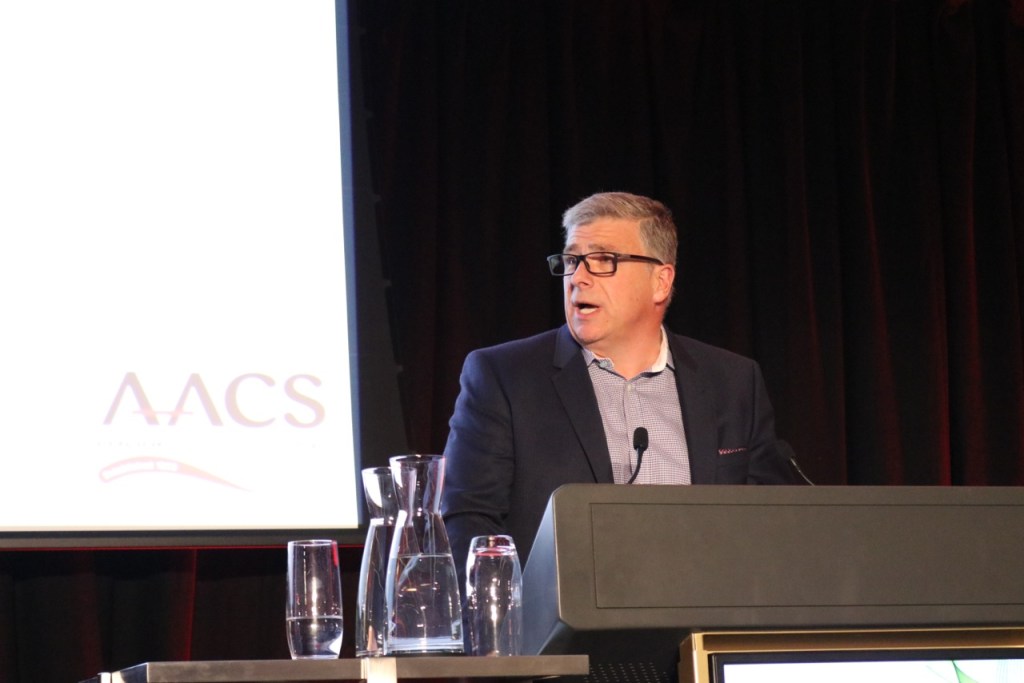
7-Eleven CEO Angus McKay presented a keynote speech at the 2018 AACS Summit in Melbourne this week and challenged the convenience industry to continue changing to remain relevant to consumers.
“Out of the gate, you might question my credentials after all I am a relative newcomer to this industry, with only two and a half years behind me, but it is that relatively short tenure that gives me license to talk about what I see is the change that has gone on in our industry and it is fair to say that we have been changing,” McKay said.
“The theme of this conference, Inspiring Change, is quite apt, we must change. Each month presents us as an industry with new acquisitions, demergers, new store formats, political intervention and the list goes on. We find ourselves in a position where we must not only collectively change but also inspire change within our industry – if we want to succeed in the decades to come.
“Over 41 years of operation, 7-Eleven has grown to become one of the largest retailers in Australia – we have adapted our business model and on multiple occasions been forced to change and shift as we absorb acquisitions – perhaps the most notable of these when we acquired Mobil 67 years ago.
“That adaption and that proactive change continues today, in fact it is an aspect of our business and our culture we take great pride in. We are proud to say that we are number one in the convenience channel and we are the largest independent fuel retailer in Australia. There are now over 685 stores around the country and our business continues to grow organically and inorganically – not only in metro but also in regional areas.
“Our stores in the convenience industry – we have more than 200 million transactions per annum and we serve seven customers every second and we generate revenue of over $4.5 billion. We take great pride that we remain family owned. We also take great pride that we are predominantly a franchise business with 85 per cent of our stores still being run by owner operators with some 400 unique operations.
“In our journey we have seen evolution and revolution. From non-fuel to fuel, from roller dogs to hot dogs, from Slurpee with sugar to Slurpee without sugar, from candy bars to protein bars and from preserved food to fresh food – so much change in our 41 years. Our business needs to keep changing, it needs to keep adapting and it needs to revolutionise itself.
“Our industry, the convenience industry, has experienced levels of change that we have not seen before. I personally believe we have to own this change and encourage it and embrace it and all of the consequences that it will have for us – it is constant and ever present.
“Sometimes the change is of our own making – we ask how can we disrupt ourselves and how can we make the markets we serve different. Sometimes the change happens to us and is based on what our competitors do and showing us a new look or a new concept. Regrettably sometimes change is forced upon ourselves for the wrong reasons – we take our eye off the ball.
“That change timeline is getting faster – our customers are at the heart of this change. Our consumers are fickle, they adapt and they change at their will, needs and desire. Our challenge is to be ready for that and we need to anticipate their needs.
“As a group of leaders in this industry we need to inspire change and we cannot afford to be passive. To be an adaptive retailer – takes skill and it takes courage. As a new entrant to this industry I have observed that for the most part, we are adapting. What presents itself to the consumer as a convenience offering is certainly different to five, ten or 15 years ago, but are we changing fast enough.
“Is our rate of change enough to keep us in line with where the consumer us going? If I reflect on my own organisation, I would be constantly challenging them and say that we are not changing fast enough. The world we play in is moving faster than ever and we battle now between bricks and mortar as well as the digital frontier – or the terrestrial and the digital dimensions.
“In the terrestrial dimension, we want our customers to shop inside of our walls, reacting to the ever-present cries for greater upsell and to increase merchandise purchases with fuel and shifting the mix of what we sell in our store. But dare I say it, those cries have hung over the retail landscape for decades. The new frontier is the digital dimension and talking directly to our customers and knowing their needs and anticipating their needs and extrapolating unknown consumer needs all with one eye on how we can customize the offer for the consumer.
“So how do we marry these two worlds? Who is going to be good enough to play in these two worlds? Can we play in both digital and terrestrial worlds – surely they can co-exist? Surely our customers want to play in both – in fact is that not the definition of convenience – providing choice to our customers.
“The digital dimension is not solely for the benefit of the customer, the digital dimension also provides us with the opportunity to change the way we do things and to make our lives simpler and to make our staff’s lives simpler and to make things quicker and more economic. It can revolutionise the way in which we manage our business and the way we transact and the way we communicate and perhaps most importantly the way we behave – it is a world of new possibilities.
“Our economy is also changing and the landscape and politics are changing and that affects the industry in which we operate in. The franchising sector has forever changed. The current political climate will see that cemented and in 7-Eleven’s case – we will need to act as an industry leader and promote change to both our industry and equally to the network in which we operate. Last week as a nation we hit 25 million people, the growth of our nation is faster than anyone ever expected.
“The faces of our nation are changing – the age and the influences of different ethnicities that make up Australia are all changing and are all promoting change.
“The landscape in our cities is changing – they are adapting to population requirements and a new way of living. The changes to our customers flow into what we sell within our stores. Our stores are highly dependent on categories we value today – but these categories already have challenges in the decades to come. How will we adapt in expanding our businesses to meet those future needs? We need to adapt or perish.”

